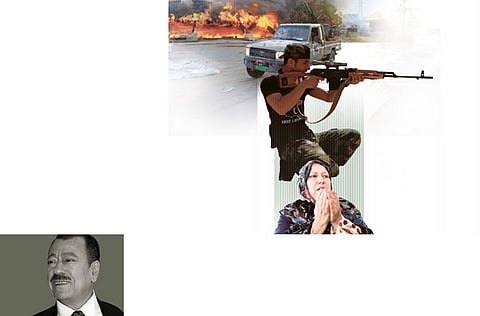Libya The Arab country is moving wildly towards disintegration.
It is possible that opportunistic pro-Gaddafi elements within Libya might join forces with terrorist group

Having intervened to depose Muammar Gaddafi, the West seems to be dissociating itself from the chaos that has ensued in Libya.
With Libyan oil production back to normal, the ‘Friends of Libya’ have re-invented themselves as the ‘Friends of Syria’, and are focused on that tinderbox instead.
Meanwhile Libya careers wildly towards disintegration. The Nato-backed revolution in Libya re-ignited old feuds and rivalries, many of them based on ethnicity, tribal loyalties and long-running vendettas; it has spewed up some new ones too.
There are dozens of heavily-armed, warring militias, fiercely guarding their various territories which they run like mini-fiefdoms.
The interim government, the National Transition Council (NTC), is unable to disarm the militias although it has tried to buy their loyalty. Last month the NTC set up a recruitment centre in an old police academy in Tripoli, paying fighters from local brigades hefty sums to patrol the capital. The plan back-fired when gunmen from a rival militia attacked the academy, chased everyone away in a hail of bullets and took the money to pay their own men.
Many Libyans are disillusioned with the unelected, Nato-backed NTC, and fear that its leaders are weak and self-interested. They worry that their revolution has been hijacked and that the NTC has failed to establish a stable infrastructure on which to build the new Libya. The NTC includes several men who were either part of, or close to, the old regime and has signally failed to stamp its authority on the post-revolutionary landscape by bringing the principal culprits to trial — including Saif Al Islam Gaddafi.
Clamour for autonomy
The militias have seized control of prisons in their territories and are populating them with their personal enemies. There are reports of widespread abuse and brutal torture as well as summary executions. Medecins sans Frontiers recently pulled out of Misrata in protest at the human rights abuses they witnessed there.
When NTC chairman, Mustafa Jalil and his deputy, Abdul Hafiz Ghoga, visited the council’s headquarters in Benghazi in late January they were attacked by several hundred protesters accusing them of corruption. Ghoga subsequently resigned ‘in the national interest’ and Jalil suspended six NTC delegates from Benghazi.
In March, a conference of over 3,000 tribesmen and leaders in eastern Libya — Cyrenica, or Barqa in Arabic — declared an autonomous federal state with Benghazi as its capital. Barqa covers almost half the country, from the centre to the borders with Egypt in the east and Chad and Sudan in the south, and is home to most of Libya’s oil. The region’s grievances against Tripoli are long-standing.
And the risk of fragmentation escalates daily. Dark-skinned Libyans in the area around Tripoli are being targeted by vengeful militias who accuse them of having fought for the Gaddafi regime.
In the south of the country, a militia composed of fighters from the Toubou ethnic group clashed with Arab tribesmen leaving more than 150 people dead to date. Last week, Toubou leaders announced the reactivation of the separatist Toubou Front for the Salvation of Libya.
Also last week, fighting broke out in the north of the country when long-standing rivalries re-ignited in Zuwara, with Berber militiamen battling pro-Gaddafi Arabs from Jamail and Raghdalin.
Elections to a 200-member National Assembly are scheduled for June and suggest an opportunity for unity. But the country has no experience of democracy and there are few organised political parties; the Muslim Brotherhood’s Justice and Development party, led by Mohammad Sowan, is the exception. The NTC has also announced that 102 seats will be occupied by delegates from the west of the country which can only add to the clamour for an independent Barqa.
In addition, there will be many security challenges when the nation goes to the polls. Several militia leaders, perhaps sensing new opportunities for personal power in the political arena, have announced their intention to stand but are not prepared to disband their brigades, often several thousand strong.
The formation of a national army is the only realistic prospect for absorbing the militia and diluting their power. Unfortunately nearly every militia leader believes he should be its commander-in-chief.
Meanwhile the Libyan crisis has given Al Qaida increased operational room, with reports of black jihadi flags being flown by the militia in Sirte, Gaddafi’s home town as well as Benghazi and parts of Tripoli. It is possible that opportunistic pro-Gaddafi elements within Libya might join forces with Al Qaida as Saif Al Islam threatened to do shortly before he was forced to flee.
The current uprising in Northern Mali where Tawareq fighters — supported by Al Qaida in the Islamic Maghreb (AQIM) henchman Mokhtar Bel Mokhtar — have taken over several key towns and cities is an example of ‘blowback’ from the Libyan conflict. Many Tawareqs joined the fighting in Libya and returned battle-hardened and well-equipped with sophisticated weaponry from Gaddafi stockpiles looted during the civil war.
The whole of the Sahel is currently destabilised by AQIM and Nigeria’s Boko Haram. A report by the British think tank, RUSI, released on Wednesday warned of “an arc of regional instability… extending through to East Africa, which… Al Qaida could well exploit to regroup, reorganise and reinvigorate its terrorist campaign against the West.”
The AQIM threat to mainland Europe is clear both from Mohammad Merah’s rampage in Toulouse and the arrests this week of scores of suspected Al Qaida operatives in southern France.
The Nato intervention in Libya has unwittingly strengthened the hand of its enemies (the Islamists and Al Qaida) just as its actions in Iraq strengthened the hand of its regional nemesis Iran. This partly explains the West’s obvious reluctance to intervene in Syria where another bloodbath is in progress.
Abdel Bari Atwan is editor of the pan-Arab newspaper Al Quds Al Arabi.
Sign up for the Daily Briefing
Get the latest news and updates straight to your inbox



